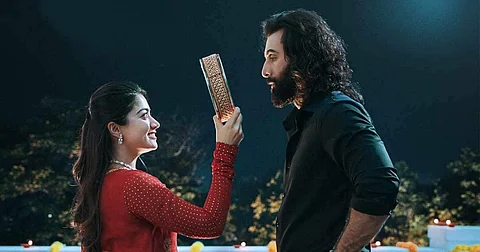

Given the overdose of violence in recent big-budget cinema, it’s hardly a surprise that we are now numbed. A storm of bullets causing people to drop like flies results in no real reaction anymore. Show blood dripping from the edges of knives and swords, and it just doesn’t irk anymore. In director Sandeep Reddy Vanga’s latest film, Animal, there is plenty of all of this, but much like his previous work, Kabir Singh, what is truly disturbing is not the bullets, machetes, or a DIY weapon that can bring down an entire army—it is the threat of violence against women.
After decades of equating submission to devotion and associating abuse with love, a few Indian films have lately begun to show an understanding of domestic abuse and social justice. Just before the nationwide lockdown in 2020, we all got an awakening in the form of Anubhav Sinha’s Thappad (Hindi), which is about a wife applying for divorce after getting slapped by her husband. The protagonist, Taapsee’s Amrita Sabharwal, believes that a single slap and the consequent lack of remorse is enough to warrant separation.
A year later, we saw Jeo Baby’s Malayalam film, The Great Indian Kitchen, talk about another woman protagonist walking out of an oppressive family setup—and in her case, after multiple instances of abuse, neglect, and exploitation. Fascinatingly, the content of The Great Indian Kitchen seemed to meet with more agreement than Thappad, and that’s not a surprise really because our society places much weight on the sanctity of marriage than on self-respect. We like to see survivors put in substantial effort to save a marriage before they save themselves.
The usual instinctive questions that come up in response to such films are rather similar and serve almost as an interrogation of the survivor. “How bad was the cruelty at your in-laws’?” or “Could you not save the marriage somehow?” Or, as was asked in the case of Jasmeet K Reen’s debut directorial, Darlings (Hindi), “Did they need to respond with such violence?” The reactions, it seems, are scrutinised more than the oppressive actions that caused them. The final blow gets discussed more than all the slaps, all the humiliation. In some films such as Kabir Singh (Arjun Reddy in Telugu), there’s simply no great resistance at all from the woman—and that too gets discussed. It seems that director Sandeep Reddy Vanga was definitely paying attention to the discourse, but the question is, how has he responded to it?
In his new film, Animal, starring Ranbir Kapoor, there seems to be a series of tongue-in-cheek responses to the criticism that came his way. In this film, the first slap is from a woman, Rashmika’s Geethanjali. She questions the protagonist’s infidelity. She registers her disregard for his dangerous fixation on his father. She even walks out of the marriage.
And all of this, in some way, may seem like an improvement from the director’s previous film, in which the woman had no agency. However, Animal warrants a closer look—and then you see all the problems in it. Geethanjali slaps but it is a response to being hurt physically. She registers disregard, but a gun is fired in response. She walks out of the marriage, but the cyclical nature of the father-son equation means that it doesn’t quite register as a big win. Geethanjali talks about how her husband was a better person when they lived in the US. But once his rage-fuelled downward spiral begins, all traces of decency disappear. You see Geethanjali living in constant vigilance, in a state of great nervousness around him. And it doesn’t necessarily feel like the film holds the protagonist accountable or asks fundamental questions of him.
This is a film fixated on the idea of the alpha male; it seems to suggest that marriages work best when a man exercises control. Much like Kabir Singh, this film, too, suggests that somewhere within all the humiliation, abuse, and suffering, there is love. Also, infidelity, it seems, is the domain of the man. One might argue that Ranbir’s Vijay is shown to be a bad person by the film. But does the film truly register this idea? Even when the film portrays him as a hot-headed broken man inclined towards mayhem, it keeps insinuating that maybe, just maybe, he is a misunderstood diamond.
Just as films like Darlings seemed to be taking the domestic abuse conversation forward, we get a film that almost makes a tragic hero out of a rather horrible husband. The filmmaker once notoriously spoke about how in real relationships born out of love, it’s quite normal for people to be slapping each other. Plenty of criticism followed, but Animal doesn’t really show that the constructive criticism has been internalised. If anything, it feels like a slap back. There is no single right way to portray such abuse. Thappad speaks of a woman wanting to exit; Darlings speaks of two women who seek revenge. So, yes, there is no single right way, but surely, there are wrong ways. And one of them is normalising abusive behaviour.
More than a decade ago, Sonakshi Sinha in her debut film, Dabangg (Hindi), said, “Thappad se darr nahi lagta sahab, pyar se lagta hai (I don’t fear slaps, I fear love).” But the tables have turned now, and women are shown slapping back. They may not fear the slapping in a film such as Animal, but what they should, in fact, truly fear, is associating torment and humiliation with love. Undoing the impact of that takes many years of good cinema. And the time to begin responding is now.